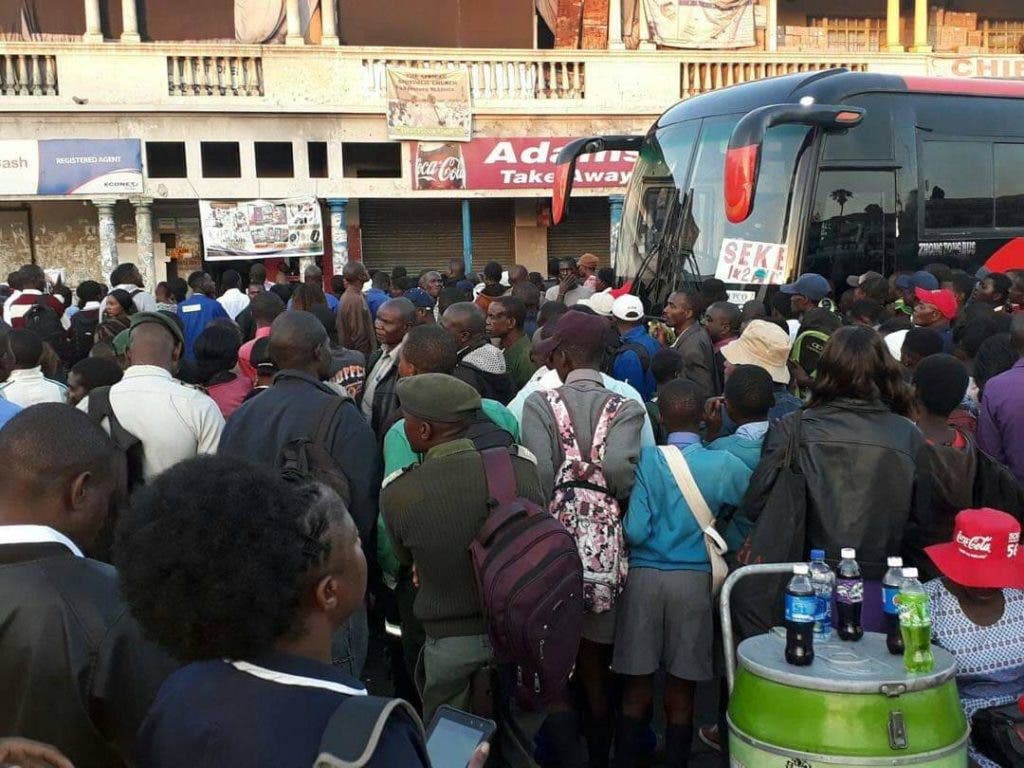Public transportation inaccessible for people with Disabilities
By Isaacs Mwale

The struggle to access public transportation in recent times has become a troublesome reality for thousands of commuters in the two largest cities, Harare and Bulawayo. The recent ban of Commuter Omnibuses or “Kombis” has left a huge void in public transportation that is now meant to be filled by the Zimbabwe Passenger Company (ZUPCO). On the 7th of April 2021 the Harare City Council confirmed the ban of the “kombis” and announced that a new transport system will be revealed soon.
Whilst the ban of the “kombis” is very justifiable in the City’s quest to decongest the roads and protect commuters, scores of people are now struggling on a daily basis to access the ZUPCO buses as the pressure to board them is very fierce, often undignified and at times very unsafe.
What is most unfortunate is that for people with disabilities these current challenges to access public transportation that have been recently exacerbated by the COVID-19 lockdown travel restrictions are nothing new. They have for a long time lamented and bemoaned the need for buses with ramps for wheelchair users and people with other physical disabilities. Speaking during a Zimbabwe Coalition on Debt and Development (ZIMCODD) public resource management meeting hosted in Bulawayo last year in May Bizwelihle Ncube said, “Accessibility of ZUPCO buses is quite a challenge for people with disabilities. I personally use a wheelchair and I cannot really board a bus. It has become a challenge for me to access other services, even visiting a doctor; I cannot do that using the public transport. I have to hire a car to take me there”.[1]
During a recent group discussion conducted by Deaf Zimbabwe Trust in Kambuzuma Harare, women with physical disabilities again bemoaned that it is almost impossible for them to board the ZUPCO bus into town because they cannot compete with other non-disabled passengers to get on the bus as they will be simply bullied and pushed away from the bus entrance. Persons with disabilities often have to be carried into the bus and they are handled inappropriately violating their dignity.
It is now very important for the various town councils not only in Harare but other cities around the country to ensure that during the development and planning of the new transport system commuters with disabilities are considered because with the current system , they are directly excluded from accessing public transportation. The new crop of buses that are coming into service must have ramps, seats and spaces reserved for commuters with disabilities.
Persons with disabilities call for consistency in the payment of grants
By Tinotenda Chikunya

Harare disability community is disgruntled over the inconsistency in disability grants payments saying lack of access to the grants was making their lives difficult.
Speaking during a focus group discussion Lameck Gono said failure by Ministry of Social Welfare has exacerbated poverty amongst the disability community as most persons with disabilities rely on grants for a living.
“Some of us don’t work so the disability grant is our lifeline. Even though it is not much we manage to buy one or two items each month like 2kg sugar but if we don’t receive it at all we struggle to make ends meet”.
Speaking during the same discussion Anna Maphosa , said persons with disabilities had last received the grants in December and had gone for 3months without receiving payment.
“We received 300ZWD in November and December but since then nothing has come , the sad thing is that no communication is provided by the Ministry of Social Welfare on why the grants are not being paid”.
“Last year they did the same thing but what surprised us was that when they finally resumed payment , the money outstanding from the previous months was not paid and now we are wondering where is the money going maybe there is corruption taking place”?
Some persons with disabilities highlighted that they had never received the grant even though they had registered their names with the Social Welfare department.
“ The department of social welfare came to Highfield and took our names down twice and each time they told us they would start paying us in 6months but 2 years later , we are still not getting the grants”
They appealed to Government to investigate the issue and to also consider increasing the grants in order for it to be in-line with the increasing cost of living.
Concern over re-opening of schools
By Tinotenda Chikunya

Parents of children with disabilities have expressed concern over the readiness of schools to re-open during the COVID-19 pandemic saying schools are incapable of catering for the need of children with special needs.,
Speaking during a psycho social support workshop hosted by Deaf Zimbabwe Trust, a parent Mercy Chimboza said schools schools are incapable of catering for the needs of children with disabilities during COVID-19 as they need special masks and care which the schools and teachers have long been unable to provide even before COVID-19.
“Our children have always been regarded as outsiders in schools and no reasonable accommodation has been madefor them , some cannot wash hands on their own , some can not keep masks on for long and the classes are crowded as all children with different disabilities are put in one class”
She highlighted that some teachers in resource units were negligent towards children with disabilities resulting in some children having near death experiences while at school.
“I found my child soaked in a tank of water at school while others were in class and the teacher had no idea where he had gone, if he had had an epileptic attack while in water he could have died, so if they could do this before COVID-19 , who knows what they can do now when they should constantly sanitise the children and check if the children have masks on””
Another parent . Lucia Manyonganise highlighted that it was difficult for children with disabilities to wear masks for a long time , greatly placing them at risk of contacting COVID-19.
“The children do not understand why they should wear masks all the time , they tend to remove them when they get to school and they drool on each other , hug each other and eat together , so keeping them at home is best as they do not get in contact with others”.
“Schools are not safe for our children , they will go when it is safe to do so because we cannot depend on the teacher to keep a close eye on them , the teachers do not care”.
She added that schools had not taken measures to ensure the safety of children with disabilities like ensuring water sources were accessible for children with disabilities and the need for hot sitting had resulted in learners with disabilities sharing a class among 3 different grades
